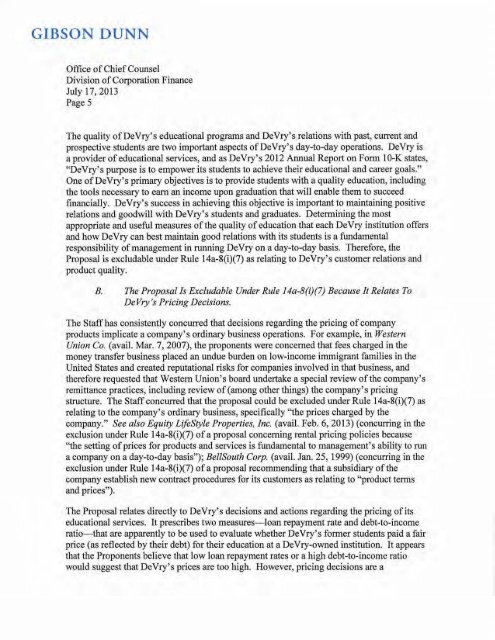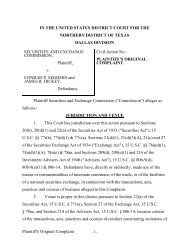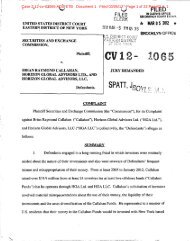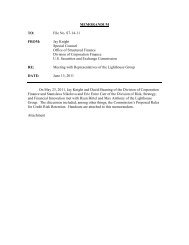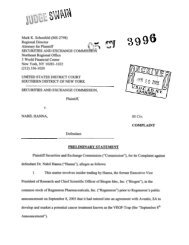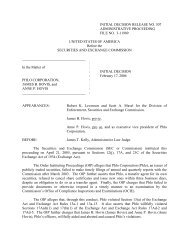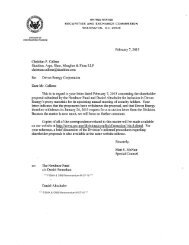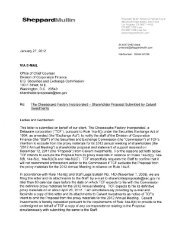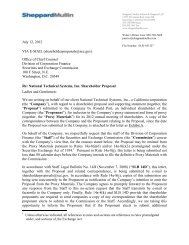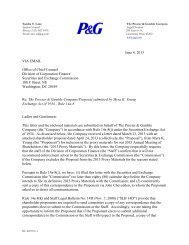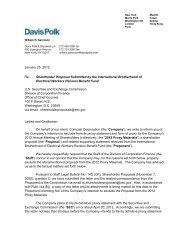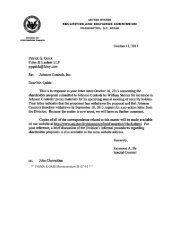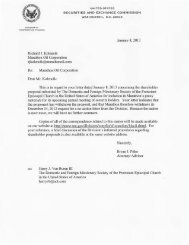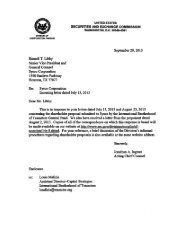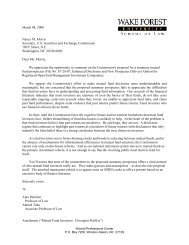GIBSON DUNN
De Vry Inc.; Rule 14a8 no-action letter - Securities and Exchange ...
De Vry Inc.; Rule 14a8 no-action letter - Securities and Exchange ...
- No tags were found...
Create successful ePaper yourself
Turn your PDF publications into a flip-book with our unique Google optimized e-Paper software.
<strong>GIBSON</strong> <strong>DUNN</strong> <br />
Office ofChief Counsel<br />
Division of Corporation Finance<br />
July 17, 2013<br />
Page 5<br />
The quality ofDeVry's educational programs and DeVry' s relations with past, current and<br />
prospective students are two important aspects ofDeVry's day-to-day operations. DeVry is<br />
a provider of educational services, and as De Vry' s 2012 Annual Report on Form 1 0-K states,<br />
"DeVry's purpose is to empower its students to achieve their educational and career goals."<br />
One ofDeVry's primary objectives is to provide students with a quality education, including<br />
the tools necessary to earn an income upon graduation that will enable them to succeed<br />
financially. DeVry's success in achieving this objective is important to maintaining positive<br />
relations and goodwill with DeVry's students and graduates. Determining the most<br />
appropriate and useful measures ofthe quality of education that each De V ry institution offers<br />
and how DeVry can best maintain good relations with its students is a fundamental<br />
responsibility of management in running DeVry on a day-to-day basis. Therefore, the<br />
Proposal is excludable under Rule 14a-8(i)(7) as relating to DeVry's customer relations and<br />
product quality.<br />
B. The Proposal Is Excludable Under Rule 14a-8(i)(7) Because It Relates To<br />
De Vry 's Pricing Decisions.<br />
The Staff has consistently concurred that decisions regarding the pricing of company<br />
products implicate a company's ordinary business operations. For example, in Western<br />
Union Co. (avail. Mar. 7, 2007), the proponents were concerned that fees charged in the<br />
money transfer business placed an undue burden on low-income immigrant families in the<br />
United States and created reputational risks for companies involved in that business, and<br />
therefore requested that Western Union's board undertake a special review ofthe company's<br />
remittance practices, including review of (among other things) the company's pricing<br />
structure. The Staff concurred that the proposal could be excluded under Rule 14a-8(i)(7) as<br />
relating to the company's ordinary business, specifically "the prices charged by the<br />
company." See also Equity LifeStyle Properties, Inc. (avail. Feb. 6, 2013) (concurring in the<br />
exclusion under Rule 14a-8(i)(7) ofa proposal concerning rental pricing policies because<br />
"the setting ofprices for products and services is fundamental to management's ability to run<br />
a company on a day-to-day basis"); Bel/South Corp. (avail. Jan. 25, 1999) (concurring in the<br />
exclusion under Rule 14a-8(i)(7) of a proposal recommending that a subsidiary of the<br />
company establish new contract procedures for its customers as relating to "product terms<br />
and prices").<br />
The Proposal relates directly to DeVry's decisions and actions regarding the pricing ofits<br />
educational services. It prescribes two measures-loan repayment rate and debt-to-income<br />
ratio- that are apparently to be used to evaluate whether DeVry's former students paid a fair<br />
price (as reflected by their debt) for their education at a DeVry-owned institution. It appears<br />
that the Proponents believe that low loan repayment rates or a high debt-to-income ratio<br />
would suggest that DeVry's prices are too high. However, pricing decisions are a


